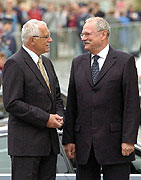Language split sees Czechs, Slovaks talk in tongues

Czech/Slovak Presidents
Language split sees Czechs, Slovaks talk in tongues
http://today.reuters.co.uk/news/newsArticle.aspx?type=worldNews&storyID=2006-01-12T031340Z_01_KWA211557_RTRUKOC_0_UK-CZECH-LANGUAGE.xml&archived=False
By Matt Reynolds
PRAGUE (Reuters) -
Ivana Formanova loves watching old movies. But when a film from the former Czechoslovakia comes on in the Slovak language, she quickly switches channels."I don't really understand it. It's too hard to sit and watch and figure out what they are saying," the 15-year-old Czech, born in the former Czechoslovakia, says.
The Slovak and Czech languages have so much in common that Czechoslovak officials once considered them two versions of the same tongue.But 13 years after Czechoslovakia split into the independent Czech and Slovak republics, the ties that bind the two languages are fraying. Some experts believe the day will come when Czechs will barely comprehend their Slavic neighbours.
"I think Slovaks felt Czechs would always understand us," said Mira Nabelkova, a Slovak linguist at Charles University in the Czech capital Prague.
Mindful of young people like Formanova, Czech television executives decided last year to begin dubbing Slovak shows into Czech. Many middle-aged and older Czechs were outraged and articles criticising the move appeared in the national press.The executives justified their decision by citing studies that show 30 percent of Czech teenagers and young adults have trouble understanding Slovak entertainment."The more you meet people, especially children, who have difficulty understanding, the more you realise how different the languages are," Nabelkova said.
TWO TONGUES
Czech and Slovak are the closest of the Western Slavic languages, which include Polish and Sorbian, but 15 percent of their vocabularies and about half their noun endings differ.
From 1918 to 1993, Czechoslovakia's bilingual state media made overcoming these differences easy for anyone with a radio or television.
Slovaks still watch Czech television and read newspapers from their bigger neighbour, and many say they barely notice whether a book or film is in Czech or Slovak.
But in the Czech Republic, Slovak television has all but disappeared, Slovak press is sold at only a few fringe shops, and most of the 200,000 Slovak residents speak Czech.
"Young Czechs have few opportunities to hear Slovak," said Nada Vokusova, president of the Slovak-Czech Club, which prints journals and magazines in both languages.
"When they grow up, they may understand Slovaks like they understand Poles, about 70 percent when they concentrate."
Having grown up in Czechoslovakia, adult Czechs are surprised to find their children cannot understand Slovak."My generation understood it absolutely no problem," said Jan Prokop, a Czech journalist who served for two years at an army base in what is now Slovakia when he was younger.Prokop's 10-year-old daughter, Olivia, is a child prodigy of mini-golf -- three-time junior champion at the World Championship and four-time junior champion at the U.S. open.
Last year, Prokop sent her onstage to answer questions at a post-tournament banquet in Arizona with a Slovak-American translator."He translated one question. Olivia just stood there. He translated another," Prokop said. "No answer. I finally realised she wasn't scared, she just didn't get it."
DRIFTING APART
A Slovak asking for beer or cigarettes in one of Prague's famous pubs will have no problem. The words are the same.But young waiters are often baffled by requests for foods that sound totally different in Slovak, such as cabbage soup.Cabbage is 'zeli' in Czech and 'kapusta' in Slovak.
Despite such differences, broad language similarities helped unite Czechs and Slovaks after the Austro-Hungarian empire collapsed following World War One, when Czechoslovakia was formed.Linguists debated whether the languages should be considered separate at all. For a time, Czechoslovakia's official language was Czechoslovak, with two separate standards, Czech and Slovak.
State television and radio broadcast in both languages, and they grew even closer. Czech expressions entered Slovak usage, and the late Communist leader Gustav Husak, a Slovak who lived in Prague, spoke a goulash of the two tongues.
Czech linguist Marian Sloboda says the growing divide between the languages has eroded the solidarity that developed between Czechs and Slovaks over 70 years.
"A few years ago, some Czech students were unhappy that Slovak students were getting spots in Czech dorms," she said.
"It was clear they viewed Slovaks as 'them' rather than 'us' ... The Slovak language fading in the Czech Republic will increase that feeling, the feeling that 'they' Slovaks are different from 'us' Czechs."
(Additional reporting by Alan Crosby)
© Reuters 2006. All Rights Reserved.

0 Comments:
Post a Comment
<< Home